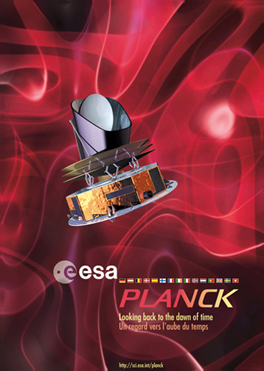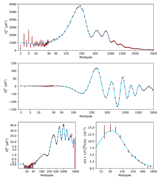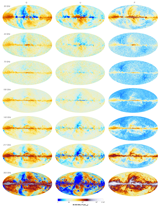Home - Planck
Planck Science Team Home
|
Go directly to Planck |
 |
Planck is ESA's mission to observe the first light in the Universe. Planck was selected in 1995 as the third Medium-Sized Mission (M3) of ESA's Horizon 2000 Scientific Programme, and later became part of its Cosmic Vision Programme. It was designed to image the temperature and polarization anisotropies of the Cosmic Background Radiation Field over the whole sky, with unprecedented sensitivity and angular resolution. Planck is testing theories of the early universe and the origin of cosmic structure and providing a major source of information relevant to many cosmological and astrophysical issues. The scientific development of the mission is directed by the Planck Science Team. Planck was formerly called COBRAS/SAMBA. After the mission was selected and approved (in late 1996), it was renamed in honor of the German scientist Max Planck (1858-1947), Nobel Prize for Physics in 1918. |
Planck was launched on 14 May 2009, and the minimum requirement for success was for the spacecraft to complete two whole surveys of the sky. In the end, Planck worked perfectly for 30 months, about twice the span originally required, and completed five full-sky surveys with both instruments. Able to work at slightly higher temperatures than HFI, the Low Frequency Instrument (LFI) continued to survey the sky for a large part of 2013, providing even more data to improve the Planck final results. Planck was turned off on 23 October 2013. The high-quality data the mission has produced will continue to be scientifically explored in the years to come.
More information on Planck may be accessed via the links to the left and right (some of the links are restricted).
Please note that these pages are largely directed to the astronomical and Planck communities.
Other Planck pages under ESA's Main Planck Portal and Sci-Tech Planck Portal are more specifically directed to the public and the press.
Latest Planck Collaboration papers
Some recent awards
-
On 5 November 2020, the Foundation for Polish Sciences has awarded the 2020 FNP Prize to Krzysztof M. Górski, a long-standing and key member of the Planck Collaboration, for "the development and implementation of the methodology of analysis of the relic radiation maps, crucial for understanding the early stages of evolution of the universe".
-
On 17 June 2019, the EPS High Energy and Particle Physics Division has awarded the 2019 Giuseppe and Vanna Cocconi Prize for an outstanding contribution to Particle Astrophysics and Cosmology to "the WMAP and Planck Collaborations for providing high-precision measurements of the cosmic microwave background temperature and polarization anisotropies, leading to detailed information on properties of the universe and tests of cosmological models and fundamental physics.”
-
On 2 July 2018, the 2018 Marcel Grossman Institutional Award goes to the Planck Scientific Collaboration (ESA), and is presented to Jean-Loup Puget, Principal Investigator of Planck/HFI
-
Jean-Loup Puget (PI of Planck/HFI) has received the 2018 Shaw Prize in Astronomy
-
The Planck Team and the PIs of LFI (Reno Mandolesi) and HFI (Jean-Loup Puget) have been awarded the 2018 Gruber Cosmology Prize.
-
The Royal Astronomical Society has presented the Planck Team with the 2018 Group Award. See here the announcement.
-
François Bouchet (DPC Manager of HFI) has been awarded the 2017 "Emilie du Chatelet" prize of the Société Française de Physique.
-
The 2016 Lancelot M. Berkeley - New York Community Trust Prize for Meritorious Work in Astronomy was awarded to Jan Tauber for "helping to lead the Planck mission to its groundbreaking success in delivering detailed maps of the cosmic microwave background and precise values of key cosmological parameters". See the announcement.
-
the 2015 AIAA Space Systems Award has been conferred to the Herschel and Planck Project Team for "outstanding scientific achievements recognized by the worldwide scientific community and for the outstanding technical performances of the two satellites". See the announcement.
-
Edison-Volta Prize: Reno Mandolesi, Jean-Loup Puget, and Jan Tauber have been awarded the 2015 Edison-Volta Prize by the European Physical Society, the Centro di Cultura Scientifica Alessandro Volta and Edison S.p.A.. Read the story.
-
Jean-Loup Puget, Principal Investigator of Planck/HFI, has been awarded the COSPAR Space Science Award for 2014. See the COSPAR and IAS announcements.
-
François Bouchet, responsible for the HFI Data Processing Centre, was awarded the Grand Prix scientifique 2014 of the Fondation Louis D. on the topic "Cosmologie et liens avec la physique au-delà du modèle standard". Read the announcement.
-
Le Prix La Recherche 2014: The french magazine La Recherche announced that this year's astrophysics prize is awarded to the Planck article on gravitational lensing by large-scale structure, for the first full sky reconstruction of the CMB lensing effect. Click to know more.
-
2014 IPMA Awards: Thales Alenia Space received Gold Medal at the 2014 IPMA Awards for the management of the prestigious space science program Herschel-Planck. Click to know more.
-
The Principal Investigator of Planck/LFI, Dr. Nazzareno Mandolesi, has been presented the Amaldi medal by SIGRAV on 15 September 2014 (more info).
-
In December 2013, a Physics World Top 10 Breakthrough of the Year award has been given to "the scientists working on the European Space Agency's Planck space telescope", for making the most precise measurement ever of the cosmic microwave background radiation.
Need help ? If you are a member of the Planck Collaboration, with access to restricted areas of Planck pages, and are having problems using these facilities, you can ask for help by sending an email to http://support.cosmos.esa.int/pla. Also note that: (a) logging in via the Cosmos portal - via Sign In in the top right corner - solves most access problems; (b) if you have problems with your password, first try the automated password reset facility via this link.
- Removed a total of (1) style text-align:center;
- Removed a total of (4) align=center.
- Removed a total of (1) border attribute.
- Removed a total of (2) cellpadding attribute.
- Removed a total of (1) cellspacing attribute.
PLANCK Status
Mission status: Planck stopped operations on 23 October 2013.
- Removed a total of (2) style text-align:center;
Latest News
-
23-27 July 2022: the workshop "From Planck to the Future of the CMB" has taken place, to discuss future challenges of CMB observations and data analysis, from the perspective of Planck experiences.
-
5 November 2020: it is our pleasure to announce that Krzysztof M. Górski, a long-standing and key member of the Planck Collaboration, has been awarded the 2020 Prize of the Foundation for Polish Sciences, for "the development and implementation of the methodology of analysis of the relic radiation maps, crucial for understanding the early stages of evolution of the universe". See the announcement here.
-
11 September 2020: Today Astronomy & Astrophysics has published a Special Issue dedicated to the Planck 2018 results, which contains 12 papers describing the processing and scientific analysis of the Planck 2018 data.
-
31 July 2019: the last data product (the Likelihood code) still missing from the 2018 Legacy release is available from today in the Planck Legacy Archive. The corresponding paper has also been made public today.
-
7 June 2019: a new Planck Collaboration paper has been released on ArXiv: Planck 2018 results. VII. Isotropy and Statistics of the CMB. See the associated article here.
-
15 May 2019: a new Planck Collaboration paper has been released on ArXiv: Planck 2018 results. IX. Constraints on primordial non-gaussianity.
-
On 2 July 2018, the 2018 Marcel Grossman Institutional Award goes to the Planck Scientific Collaboration (ESA), and is presented to Jean-Loup Puget, Principal Investigator of Planck/HFI).
-
We congratulate Jean-Loup Puget (PI of Planck/HFI) for receiving the 2018 Shaw Prize in Astronomy !
-
We are thrilled to find out that the Planck Team and the PIs of LFI (Reno Mandolesi) and HFI (Jean-Loup Puget) have been awarded the 2018 Gruber Cosmology Prize !
-
We are happy to announce that the Royal Astronomical Society has presented the Planck Team with the 2018 Group Award. See here the announcement.
-
We congratulate François Bouchet (DPC Manager of HFI) for being awarded the "Emilie du Chatelet" prize of the Société Française de Physique.
-
We are happy to announce today (20 September 2016) that Astronomy & Astrophysics has published a Special Feature containing the 28 "Planck 2015 results" papers. A press release accompanies the event. We thank the publisher (EDP Sciences) for providing open access to all these papers on the site of A&A.
-
Constraints on reionization history and optical depth: The Planck Collaboration has published in A&A two articles describing improved HFI polarization data at large angular scales, a new estimation of the reionization optical depth, and new fits to Lambda-CMB models with various parametrizations of the reionization history. Read more here.
- Removed a total of (1) align=center.








































 Sign in
Sign in
 Science & Technology
Science & Technology








